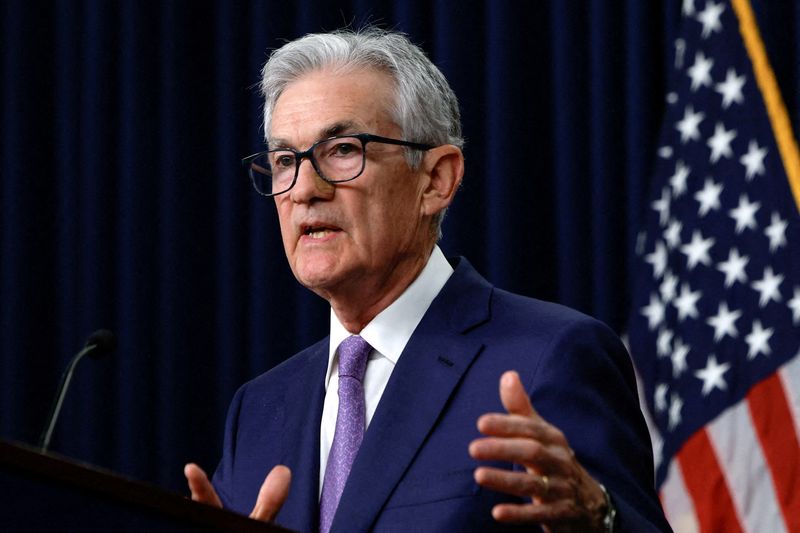By Howard Schneider
WASHINGTON (Reuters) - Federal Reserve Chair Jerome Powell on Monday kicks off what is shaping up as a key week of commentary from U.S. central bank officials taking stock of slowed inflation and mulling whether to signal the start of interest rate cuts because of it.
The Fed meets July 30-31, but under the central bank's rules policymakers can't comment about monetary policy from this Saturday, July 20, until the Friday after the meeting.
With inflation edging closer to their 2% target and rising concerns about how long the job market can stay strong with the Fed's foot on the economic brake, they may well use those final days to either flag that rate cuts are imminent or explain why recent data still doesn't warrant a turn to easier monetary policy.
The betting in recent days has tilted strongly towards the Fed, after a false pivot late last year that seemed to put rate cuts on the horizon, finally deciding that the pandemic-era outbreak of inflation has been controlled.
"We expect a strong signal in July that cuts will begin at an upcoming meeting," likely September if the economy evolves as expected, Citi analysts wrote on Friday, a day after weak June inflation prompted investors to boost the estimated likelihood of a September cut to over 90%, according to data from CME Group's (NASDAQ:CME) FedWatch tool, while some major banks and investment houses pulled forward their own rate cut calls.
Policymakers are not expected in the coming meeting to lower the benchmark interest rate from the 5.25% to 5.5% range where it has been held since July of 2023. But recent weak inflation reports may lead them to change their policy statement in a way that flags a possible rate cut at the next meeting in September, and this week's comments will be parsed to see how the latest data has shaped policymakers' views.
The Consumer Price Index fell in June after remaining unchanged in May, while a Friday report on wholesale prices showed price pressures slowing in areas like healthcare that should further build the case for easier monetary policy.
ENOUGH GOOD DATA?
Powell speaks at 12:30 p.m. EDT (1630 GMT) Monday at the Economic Club of Washington.
He told U.S. lawmakers last week that "more good data" on inflation would pave the way to lower borrowing costs, but said he would not hint at the timetable for making a decision.
His congressional testimony, however, came before CPI and Producer Price Index reports led economists to estimate that the Personal Consumption Expenditures price index, used by the Fed to set its inflation target, fell below 2.5% in June from 2.6% in May. PCE data for June will be released on July 26.
Powell and other Fed officials say they want to begin cutting rates before inflation actually hits 2% since the impact of monetary policy takes time to reach the economy. Waiting too long, they fear, could keep interest rates too high and slow things more than necessary.
Among this week's speakers, Fed Governor Adriana Kugler delivers remarks on Tuesday afternoon, while Fed Governor Chris Waller has an event scheduled on Wednesday morning and New York Fed President John Williams has an overseas appearance on Friday. Richmond Fed President Thomas Barkin, a current voter on interest rate policy, speaks Wednesday morning as well.
Waller's remarks at a Kansas City Fed event could be of particular note. He has been an important voice in the inflation debate, considered hawkish by temperament but someone who has recently noted from his own research that the job market is at a point where further weakening could lead to a faster rise in the unemployment rate.
Cooling in the job market so far, Fed officials feel, has been absorbed largely through a decline in the massive number of job openings posted by businesses in response to the strong demand for goods and services coming out of the pandemic.
Nevertheless, the unemployment rate has been steadily ticking up. It breached 4% for the first time in over two years in June, when 4.1% of people wanting a job did not have one.
In late May Waller said he still wanted to see "several more months of good inflation data" before he would support a rate cut, and on Wednesday he will have the opportunity to say how much progress he feels has been made.
Since his last monetary policy remarks, the PCE price index has fallen from 2.7% to 2.6% in May, with a further decline now expected.

If coming data, including an initial report on second-quarter economic growth, continues to show easing price pressures, it may cause the Fed in its next statement to change longstanding language that says inflation "remains elevated," a phrase many economists see needing to be altered to open the door to rate cuts.
"You're seeing the inflation rate...come down to something like what the target is," Chicago Fed President Austan Goolsbee said Friday on National Public Radio's Morning Edition. "The more data you get like what we got this week...the more confident you will be that you're on the path back to 2%."